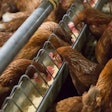
Post Holdings’ foodservice segment started to show a recovery during the fourth quarter of the 2020 fiscal year, which ended September 30, but the company’s CEO said COVID-19 challenges remain.
The sales for the foodservice segment for the fourth quarter were $320.5 million, down from the fourth quarter 2019 sales of $417.6 million, but up from the third quarter 2020 sales of $242.3 million. The segment faced a $4.9 million loss for the quarter, compared to a profit of 39.8 million for the fourth quarter of 2019 and $40.3 million loss for the third quarter of 2020.
“This is a slow build and ultimate recovery to pre-pandemic levels will not occur quickly,” Post Holdings President and CEO Robert Vitale said during the quarterly earnings call on November 20. “We continue to see profound weakeness in key channels, such as education, travel and lodging. At the same time, we were quite encouraged by the adaptations in all sectors of the restaurant industry that have led to impressive volume recovery.”
Post Holdings is the parent company of the largest egg products company in the United States, Michael Foods. Post’s foodservice segment involves primarily egg and potato products.
Jeff Zadoks, Post Holdings chief financial officer, said the foodservice segment saw its sales and volumes for the quarter both drop approximately 23% on a year-over-year basis. Both the sales and volumes saw a “slight benefit” from Post’s July acquisition of Henningsen Foods, Zadoks added.
“These declines reflect lower away from home demand in reaction to COVID-19, particularly in the morning day part within the full-service restaurant, quick-service restaurant, education and travel and lodging channels. Foodservice volume recovery remains highly correlated with the degree restrictions are imposed on mobility and gathering. We continue to anticipate a full recovery will likely take through fiscal 2021,” said Zadoks.
View our continuing coverage of the coronavirus/COVID-19 pandemic.



















